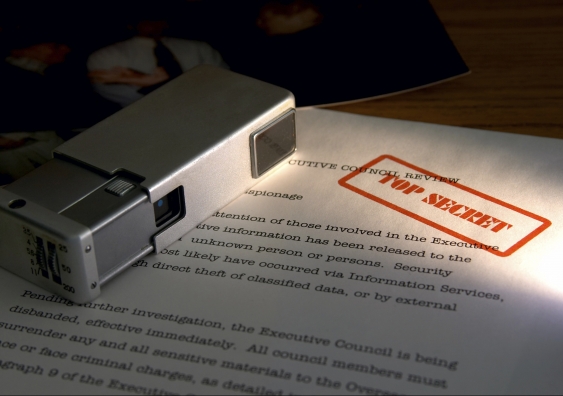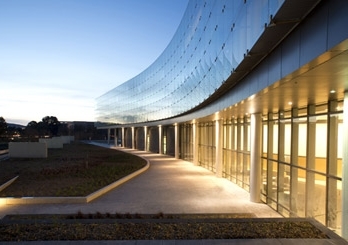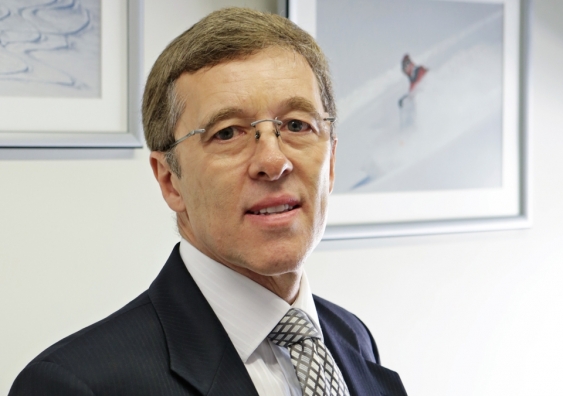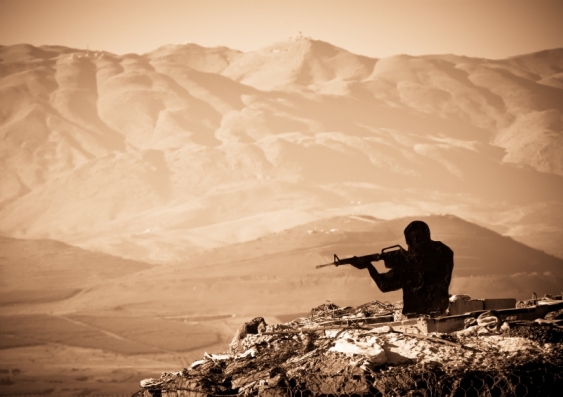Spymaster bringing ASIO in from the cold
The head of the Australian Security Intelligence Organisation is focused on new and emerging threats, writes Alan Dupont.
The head of the Australian Security Intelligence Organisation is focused on new and emerging threats, writes Alan Dupont.

Myles Gough
02 9385 1370
myles.gough@unsw.edu.au
That it was not always so reflects the more troubled times in which we live and the long journey to relevance and public acceptance ASIO has travelled since its establishment, in 1949, as an antipodean offshoot of Britain’s far better known security service, MI5.
Serious threats to Australia’s territorial and border integrity, 21st-century cyber attacks, the lethal barbarity of transnational terrorist groups and sophisticated espionage by foreign powers intent on stealing Australian secrets and intellectual property are high on the government’s national security agenda.

The new ASIO building in Canberra (Credit: www.asio.gov.au)
They are also ASIO’s core business, which goes a long way to explaining its elevated brand recognition.
Even so, it is surprising how little is known publicly about ASIO’S role, activities and people. Keen to bridge the knowledge gap with the community it serves and a year into his tenure as director-general, Duncan Lewis has agreed to his first substantive interview.
It is immediately apparent Lewis is the antithesis of the rumpled, overweight, bespectacled and introverted spy masters who populate the pages of Cold War fiction. Smartly dressed in a dark blue suit, the director-general is lean, fit, warm and outgoing with a relaxed authority that comes from long command and leadership experience. A picture on his office wall capturing a moment in time of his service with the elite Special Air Service regiment in Afghanistan’s inhospitable Oruzgan province is a reminder of the 33-year army career he left behind in 2005, swapping combat fatigues for a suit to become a public servant.
It is surprising how little is known publicly about ASIO’S role, activities and people.
Reflecting on the challenges confronting ASIO, Lewis believes the circumstances of Australia’s security environment have changed “profoundly and negatively largely because of the rapidly evolving terrorist threat which for the first time poses a fundamental challenge to domestic security”. “Previously, terrorism was regarded as something which affected other parts of the world, not Australia,” he says. “That is clearly not the case today.”
Lewis points out that “two-thirds of all actual and foiled terrorist attacks against Australians since 9/11 have occurred in the past 12 months”, reflecting a spike in terrorist activities globally. Last year was the most lethal in the 45 years records have been kept, with 13,000 terrorist attacks leading to the deaths of 32,000 people.
This is why his predecessor, David Irvine, on his last working day at ASIO on September 12 last year, elevated the terrorist public alert level from medium to high, where it remains. Since then, there have been two terrorist attacks in Australia — on the Endeavour Hills police station in Melbourne and the Lindt cafe in Sydney — and at least six potential attacks disrupted by ASIO.
ASIO is conducting more than 400 high-priority counter-terrorism investigations, a 100 per cent increase in cases since last year.
Another important difference, Lewis argues, is the “homegrown threat from disaffected Australians who would do the country harm, which is a problem for the whole community, not just the security and intelligence agencies”. What has surprised him is the youth of many recent converts to Islamic State, also known as ISIL, and how quickly they have become radicalised — often in a matter of months — and the pervasive role of social media in assisting the process of radicalisation, which has moved from “the mosques to the prayer room and now the bedroom”.
“ISIL has been particularly adept at exploiting the sense of grievance felt by some in the Muslim community through the use of social media. But this doesn’t explain why non-Muslims have been attracted to the ISIL cause or Muslims with only a perfunctory knowledge of Islam,” he says.

UNSW Professor of Security Alan Dupont
Lewis sees a strong parallel between the cult of ISIL and that of street gangs, in their powerful appeal to many young people’s quest for identity and belonging.
The big challenge we face is dealing with battle-hardened terrorists returning from conflicts in Iraq and the Middle East who have honed their terrorist skills and want to wage war in Australia.
Lewis believes ASIO has a “pretty good grip” on terrorist numbers. He estimates there are at least 120 Australians fighting with Islamic extremist groups in Syria and Iraq who could return, unless prevented, and that there are another 170 sympathisers who are actively supporting these groups financially and with recruitment.
“Although we know a great deal about the current terrorist threat, we don’t know how big the problem could be or how it might mutate in the future, so we carry significant risk. It’s pretty clear that the fight against terrorism is going to be a long and difficult one,” he says.
Citing this year’s Lowy Institute poll, Lewis is unsurprised it found “the lowest feelings of safety among Australians” in its 11-year polling history, with “fewer than one in four (24 per cent) Australian adults say(ing) they feel very safe”; nor is he surprised the emergence of Islamic State was considered by respondents as “the highest risk to Australia’s security over the next decade”.
“Cyber espionage is attractive to foreign powers because it has the potential to provide access to large aggregations of valuable information and it is easy for the foreign power to deny their involvement. Hostile cyber activity can also include digital sabotage and other activities that advantage a foreign power through accessing and affecting Australia’s cyber systems,” Lewis says. And states are not the only issue, as Islamic State’s skilful use of social media demonstrates.
These observations are borne out by this year’s Australian Cyber Security Centre threat report, which shows reported cyber security incidents as having quadrupled since 2011. One of the problems for ASIO in tracking suspicious electronic communications is the use of sophisticated encryption techniques by criminals, terrorists and spies that “is light years ahead of what it was”. As a result, the intelligence community “has been going dark”, Lewis laments.
Part of this is also due to the difficulty of retrieving information from telecommunications companies for protective security reasons, which is why the government introduced legislation to require telcos to store metadata for up to two years. Lewis would have preferred five but can live with two. “It’s a challenge to get rules around this stuff” because the technology is outrunning the capacity of politicians to keep up.
ASIO is conducting more than 400 high-priority counter-terrorism investigations, a 100 per cent increase in cases since last year.
Although ASIO has primary responsibility for ameliorating the adverse security impact and effects of cyber attacks, it needs to work “hand in glove with the Australian Signals Directorate, law- enforcement agencies, government, business and the telecommunications industry in particular”.
“We sometimes forget,” Lewis says, “that Australia is a significant country in its own right” because of our growing population, attractiveness as a tourist and education destination, rich resources, strategic location at the crossroads of the Indian and Pacific oceans and our alliance with the US. This makes us an “attractive target for other countries”.
But how well is ASIO equipped to counter these threats? Lewis is frank about the organisation’s past failings. “ASIO’s history has been chequered,” he says.
On the down side was its obsessive secrecy and the widespread lack of public trust that contributed to the disastrous 1973 Commonwealth Police raid on ASIO offices in Melbourne and Canberra instigated and led by then attorney-general Lionel Murphy. “It doesn’t get any worse than that,” says Lewis.
Coming into the organisation as an outsider, but with the perspective of someone who has observed the organisation closely for 20 years, he has been pleasantly surprised by “the extremely high quality of the workforce and levels of training I have found” and ASIO’s technological proficiency, which is “beyond what I expected”.
In response to criticisms that there is insufficient oversight of ASIO’s activities, which risks infringing on Australians’ civil liberties, Lewis highlights the comprehensive and interlocking system of external oversight and accountability established in recent decades. It includes the attorney-general as the responsible minister; parliamentary committees (Senate estimates and the Joint Committee on Intelligence and Security); the courts; an Inspector-General of Intelligence and Security with powers akin to a royal commission; and an Independent National Security Legislation Monitor.
Under the defining 1979 ASIO Act, ASIO is the only agency empowered under Australian law to undertake investigations into, and collect intelligence on, the activities of Australian citizens. What has impressed Lewis particularly is what he calls “the lawful culture of the organisation” and the rigour of the internal mechanisms for ensuring due process, especially in the execution of the power to investigate. The act has been carefully crafted to ensure there is an appropriate balance between individual rights and the public’s collective right to security. Lewis is adamant this balance will be maintained. “ASIO holds some of the most intrusive powers available to any government agency,” he says, “so we need to have an effective system of checks and balances to ensure that these powers are not abused or misused.”

Image: iStock
He is keen to point out two common misperceptions about the organisation’s role. “ASIO is often incorrectly seen as a purely domestic security intelligence agency when in fact it is responsible for the security of Australians wherever they are, which obviously includes overseas,” Lewis says.
“Australia cannot go it alone in the current hostile environment and that is why we have intelligence partnerships with friends and allies.” As more and more Australians travel and live overseas — the Australian diaspora numbers more than one million — ASIO’s international footprint has increased, correspondingly, with officers posted throughout Asia, North America, the Middle East and Europe to liaise with the security agencies of host countries and share intelligence.
ASIO holds some of the most intrusive powers available to any government agency so we need to have an effective system of checks and balances to ensure that these powers are not abused or misused.
Also not widely understood is ASIO’s unique position as the only Australian intelligence agency that collects and assesses security intelligence, which requires staff to have well-developed operational and analytical skills.
To carry out these roles Lewis is in charge of an organisation that has a budget of $514 million and has more than doubled in size during the past 40 years, from 750 staff to about 1800.
He believes this is about right for ASIO, which has moved “from the margins to the centre of government attention and the Australian intelligence community”.
Lewis smiles wryly when asked about his shiny new $650m purpose-built building and the hi-tech windows that fell off during the first few months of occupation. Teething problems, he remarks: “Don’t worry, they’ve all been fixed.”
He is a big fan of the building, which he describes as “an architectural masterpiece”. When asked about media speculation the building was bugged by China before ASIO moved in, Lewis chooses his words carefully: “While I appreciate the intrigue surrounding such sensational speculation, it is simply not correct. I have every confidence in the security of the ASIO building — the building was not compromised and remains uncompromised.”
He acknowledges criticism that the high-level security requirements needed to access the building may deter other members of the intelligence community from visiting and detract from ASIO’s community and business outreach, but he does not believe it’s a fatal flaw.
He points out “access and user-friendliness has to be balanced against the paramount need to protect the anonymity of officers and sensitive information on Australian citizens for which ASIO has stewardship under its act”.
The states are important stars in ASIO’s constellation and crucial to the effectiveness of Australia’s counter-terrorism responses. “Terrorism is a crime and states have an important operational and statutory role in law-enforcement. That is why ASIO has formal representation in every state and territory in Australia,” Lewis says. The director-general spends considerable time engaging with the state ministers responsible for law enforcement — “we are reaching out to the states and they to us”.
What’s on his wish list? “People, not money,” he says. As with any organisation, having the right people is the key to success, but it’s not easy to find or recruit them because “so many Australians seem to feel that they are not qualified or wouldn’t consider a career in ASIO”.
He wants staff with good technical qualifications, ideally with people skills to match. But so does every other organisation. “It’s very competitive and ASIO can’t always match what is on offer in the private sector in a remuneration sense. But we must find ways around this and hope the intrinsic interest of the job compensates.”
Asked about the future and his aspirational goals, Lewis thinks “ASIO will have to be very different a decade hence to make it fit for purpose for tomorrow’s security environment. It will inevitably be more technology-based and the workforce needs to be more diverse to better reflect modern Australia, although gender diversity is quite good with women making up almost half the organisation.”
And what of the man entrusted with the responsibility to lead ASIO into this uncertain future? Does a former army officer have the requisite skills and experience? Lewis thinks so and feels well qualified for the role.
ASIO holds some of the most intrusive powers available to any government agency so we need to have an effective system of checks and balances to ensure that these powers are not abused or misused.
Reared on a semirural property just outside Perth, Lewis says he was nothing special at school. He confesses to being the quintessential Aussie boy of the late 1960s, more interested in sport and running around with his mates than academic endeavour. But he was always competitive and up for a challenge, so the army seemed a good fit for him.
He credits his grandfather, who fought at Ypres as a Digger in World War I and later served as a medical corps officer during World War II, for his decision to enter the Royal Military College, Duntroon, in 1972 as an 18-year-old after a year working in a bank. However, boredom soon set in as Australia’s peacetime army entered a long period of inactivity, a far cry from today’s high-tempo operations. After briefly contemplating resignation he instead opted to join the SAS and his life changed irrevocably.
Looking back, Lewis makes several interesting observations about his decade in the special forces community, which included command of the SAS regiment and eventually promotion to major-general as the first special forces commander, a period that coincided with Australia’s Iraq and Afghanistan deployments. The SAS attracted him for two reasons: “its relentless pursuit of excellence” and “the special bonding that comes from working in a small team environment with highly trained professionals”, he says. Lewis clearly believes developing a team-based approach and pursuing professional excellence are important for ASIO too.
His time in the army and special forces also gave him early insights into the emerging threat of terrorism and valuable experience in counter-terrorist operations. He was a young officer in the SAS regiment when plans were laid to establish the first national counter-terrorist force in the SAS. This was in response to a series of high-profile terrorist attacks in Australia and overseas, including the Hilton bombing, several aircraft hijackings in the Middle East, and the 1980 Princes Gate terrorist attack in London’s South Kensington when a black-clad British SAS team blew its way into the Iranian embassy to successfully free hostages held by an Iranian terrorist group.
A posting to the Middle East as a UN observer during the 1982 Lebanon war followed, which included stints living in Damascus, Beirut and Tel Aviv. Indonesia also features prominently in the Lewis CV and has a special place in his heart.
After contemplating leaving the army for a second time, in 1993 Lewis was offered the opportunity to learn Indonesian and then the position of army attache in Jakarta. He accepted both with alacrity and served with distinction in the position, according to several former Indonesian and Australian colleagues who worked closely with him.
Then came a breakthrough moment when he was asked by Andrew Metcalfe, a deputy secretary in the Department of the Prime Minister and Cabinet, whether he would be interested in a secondment to head up the rapidly expanding national security division in the department.
Lewis decided that if he was going to go it would be better to make a clean break. Much as he enjoyed the army, it was time to move on. “I didn’t want to go to my grave just being a soldier,” he says. He found the transition “very easy”. His extensive special forces experience had already given him broad exposure to the burgeoning national security community and the whole-of-government approach to security that accompanied and informed it.
Advancement came rapidly, with Lewis promoted by prime minister Kevin Rudd to the position of Australia’s first, and arguably most influential, national security adviser, followed by promotion to secretary of defence.
Then, for the first time in his stellar career, Lewis suffered what appeared to be a terminal setback when his relationship with then defence minister Stephen Smith became strained, then untenable, leading him to accept the offer of ambassador to NATO and the EU after only 13 months as secretary.
Lewis declines to be drawn on the reasons for his departure from Defence. But the consensus of those privy to the circumstances is he felt he could not support and defend the savage cuts to the defence budget during Smith’s stewardship and felt he had no option but to move on.
This principled position seems entirely characteristic of the man. It is striking how many senior officials and former colleagues, interviewed for this story, singled out Lewis for his integrity and “moral courage”.
He also has a reputation of being politically savvy and possessing good judgment and natural people skills. A colleague who has known Lewis throughout his army and public service careers observes Lewis “has always been a perceptive, astute judge of people and a wise head — on complex operational and policy matters his is the voice you want to hear”.
Former governor-general and SAS commander Michael Jeffery recalls Lewis as an extremely able officer whose seamless transition to high public office “speaks well of his talents and capabilities and the high regard in which he is held by both sides of politics”.
Within the wider intelligence community, Lewis is clearly respected by peers and subordinates for his inclusive management style, ability to manage powerful bureaucratic interests and facility for bringing together key stakeholders.
One senior intelligence official who has worked closely with Lewis describes him as a consummate professional — “low-key, low-ego and outcome-oriented”.
He will need to call on all these skills in his present position because a modern, effective, engaged ASIO is essential for protecting the security of all Australians in an era of protean threats. Acutely aware of this heavy responsibility Lewis is determined ASIO will not be found wanting on his watch.
Alan Dupont is professor of international security at the University of NSW and a nonresident fellow at the Lowy Institute. He is contributing National Security Editor for The Australian.
This piece first appeared in the Weekend Australian.